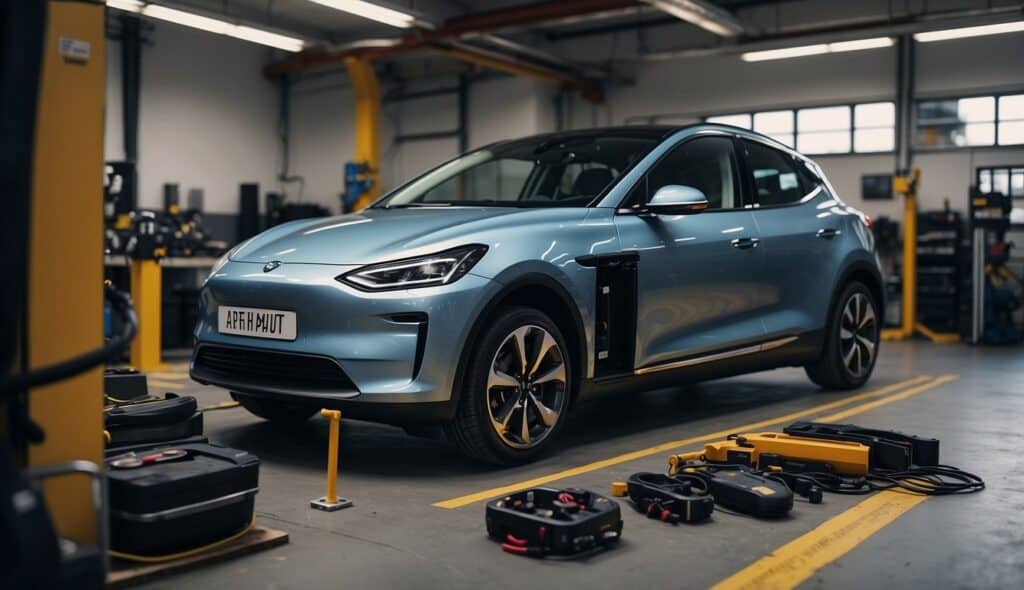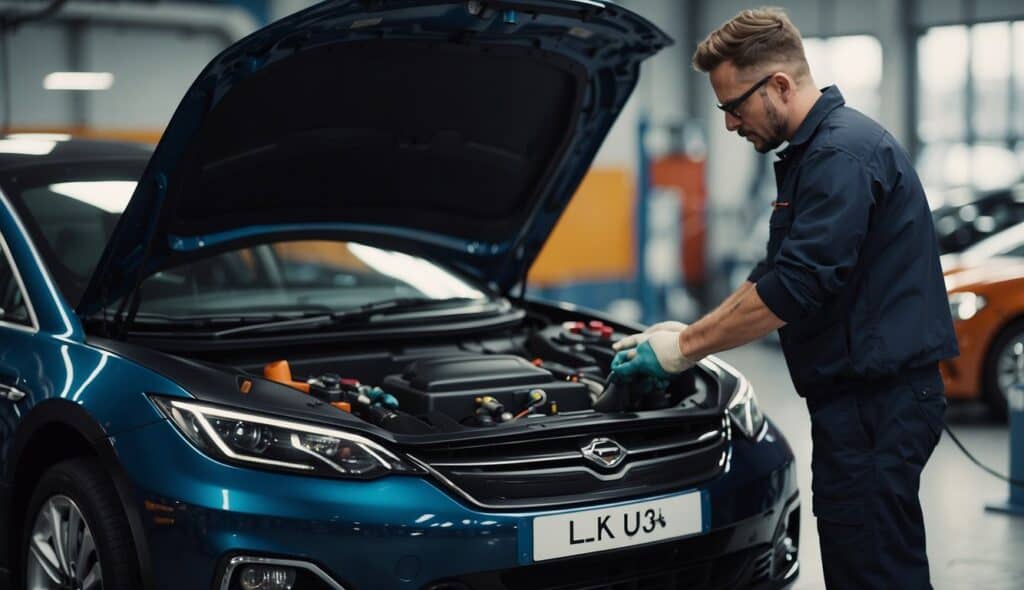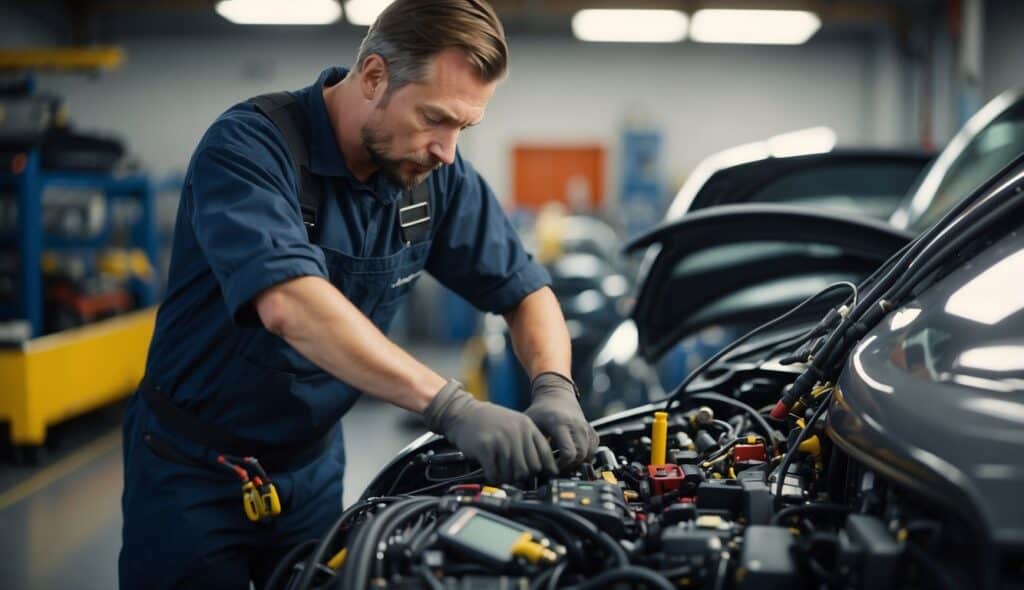Becoming an electric car mechanic in the UK is a timely and rewarding career choice. With the rise of electric vehicles (EVs) and the UK aiming to ban new petrol and diesel cars by 2030, there is a growing demand for skilled technicians in this field. Those interested in this career need to gain specific electric vehicle qualifications, which can be pursued at various educational levels such as VRQ, NVQ, and VCQ, specifically designed for students in key stages 4 and 5.
The earning potential for electric car mechanics is also compelling. The average salary for an electric car mechanic in the UK ranges from £32,000 to £40,000 per year. Entry-level mechanics can expect to start on the lower end of this spectrum, while experienced technicians can command higher wages. Specialized training programs, such as those offered by EV Training, provide essential skills and certifications, ensuring technicians are well-prepared to handle the complexities of modern electric vehicles.
Pursuing a career as an electric vehicle technician involves a mix of theoretical knowledge and hands-on experience. Technicians are responsible for inspecting, maintaining, and repairing EVs to ensure they remain safe and functional.
As the number of electric vehicles on UK roads continues to increase, skilled EV mechanics will be crucial to supporting this transition. Training and certification from reputable institutes, such as the Institute of The Motor Industry, can provide the foundation for a successful and sustainable career in the automotive industry.
Understanding the Electric Vehicle (EV) Industry
The electric vehicle industry has seen significant changes over the past few decades, driven by technological advancements and a growing environmental concern. It’s essential to recognize the key trends, including the evolution of electric vehicles, their environmental impact, and the rise of both hybrids and pure electric models.

Evolution of Electric Vehicles
Electric vehicles (EVs) have come a long way since their inception. Initially, they were seen as a niche market with limited range and slow speeds. However, significant improvements in battery technology and energy efficiency have transformed them into viable alternatives to traditional vehicles.
Tesla, a major player in the EV market, has been instrumental in pushing the boundaries. New models now offer longer ranges and faster charging times. These advancements have also made EVs more accessible and practical for everyday use.
The UK market is rapidly adopting EV technology, with incentives and infrastructure improvements making it easier for consumers to switch to electric. As a result, EVs are becoming a common sight on UK roads.
Environmental Impact and Climate Change
One of the primary reasons for the shift towards electric vehicles is their potential to reduce greenhouse gas emissions. By using electricity instead of fossil fuels, EVs can significantly lower transportation’s carbon footprint, which is crucial in addressing climate change.
Electric vehicles produce zero tailpipe emissions, which means less air pollution, improving air quality in urban areas. This is especially important in cities like London, where air pollution is a significant public health issue.
Hybrid vehicles, which combine a gasoline engine with an electric motor, also reduce emissions. While not as eco-friendly as pure electric models, they are a step in the right direction and offer a transitional solution for many drivers.
The Rise of Hybrids and Pure Electric Models
The automotive industry is seeing a notable shift towards both hybrid and pure electric models. Hybrid vehicles offer the convenience of traditional fuels with the benefits of electric power, making them an attractive option for many drivers.
On the other hand, pure electric models provide a completely emission-free driving experience. Brands like Tesla continue to innovate in battery technology and design, setting new standards for performance and efficiency.
The UK government supports this trend through policies and initiatives to increase the adoption of electric vehicles. Incentives such as grants for purchasing EVs and investments in charging infrastructure are making it easier for consumers to make the switch.
The demand for skilled electric vehicle mechanics is also growing as the market evolves. This presents a unique opportunity for those looking to enter a field with promising career prospects.
Check out Are Electric Car Charging Stations a Good Business Opportunity?
Fundamentals of Electric and Hybrid Car Technology
Electric and hybrid vehicles utilize specific systems and components that differ from traditional gasoline vehicles. Understanding these fundamentals is essential for anyone aspiring to become an electric car mechanic.

Electric and Hybrid Vehicle Systems
Electric and hybrid vehicle systems are designed to improve efficiency and reduce emissions. These systems include electric motors, inverters, and regenerative braking. Electric motors convert electrical energy into mechanical energy, powering the vehicle. Inverters change direct current (DC) from the battery into alternating current (AC) to run the electric motor.
Regenerative braking is a key feature in hybrid and electric cars. It recovers energy during braking and charges the battery. This technology increases efficiency and reduces wear on brake components. Hybrid cars often combine an internal combustion engine with an electric motor, allowing for varied power sources and improved fuel economy.
High-Voltage Components and Batteries
High-voltage components and batteries are crucial in electric and hybrid cars. These batteries store electrical energy and supply power to the motor. Lithium-ion batteries are commonly used due to their high energy density and lightweight properties. They typically range from 200 to 400 volts.
Battery management systems (BMS) monitor and regulate battery performance, ensuring longevity and safety. Understanding batteries’ charging and discharging cycles is important for anyone working with electric vehicles. High-voltage components require special handling and precautions due to the risk of severe electric shock.
Safety Measures for EV Technicians
Due to high-voltage systems and components, safety measures are essential for electric vehicle repair. Technicians must wear insulated gloves, use insulated tools, and follow strict safety protocols. Proper training on handling high-voltage systems is vital to prevent accidents.
Electric car mechanics should be familiar with lockout/tagout procedures, which isolate energy sources before maintenance. Emergency response training for electric vehicle incidents is also important. Awareness of specific hazards, such as battery thermal runaway, can prevent serious injuries.
Technicians must always adhere to manufacturer guidelines and industry standards. Regular safety audits and updated training ensure a safe working environment. Understanding and respecting the power and complexity of EV systems can make a significant difference in maintaining safety.
Check out Should I Buy a Used Electric Car?
The Role of an Electric Car Mechanic
Electric car mechanics play a crucial role in keeping electric vehicles (EVs) efficient and safe. Their responsibilities include diagnosing issues, performing repairs, and maintaining various electric vehicle systems. These tasks require specific skills and a keen attention to detail.
Key Responsibilities and Skills
An electric car mechanic is responsible for a range of tasks that ensure the vehicle’s optimal performance. They must perform routine inspections, identify issues, and carry out maintenance. Mechanics also need to understand the intricacies of electric vehicle technology.
Key Skills:
- Technical Proficiency: Understanding of EV systems and components.
- Problem-Solving: Ability to diagnose and fix issues.
- Attention to Detail: Ensuring thorough inspections and repairs.
- Communication: Explaining issues and repairs to clients.
They often work in garages or dealerships, maintaining a broad range of electric car models.
Diagnostics and Repair
Diagnosing issues in electric vehicles is a critical task. Mechanics use specialized tools and software to pinpoint problems, including checking battery performance, electric motors, and electronic control systems.
Steps in Diagnostics:
- Initial Inspection: Visual and software checks.
- Testing: Using diagnostic tools to identify faults.
- Analysis: Interpreting data to find the root cause.
For repairs, mechanics may replace faulty components, recalibrate systems, or update software. Attention to detail is vital to ensure repairs are successful and the vehicle is safe to drive.
Maintaining Electric Vehicle Systems
Maintaining electric vehicle systems is essential to prevent future issues and extend the vehicle’s lifespan. Mechanics regularly check the battery, motor, and other electronic systems.
Maintenance Tasks:
- Battery Checks: Ensuring optimal charge and health.
- System Updates: Installing the latest software updates and patches.
- Component Inspections: Checking for wear and tear on electrical parts.
They also educate car owners on how to care for their electric vehicles, emphasizing the importance of regular maintenance. By following these practices, electric car mechanics help ensure the longevity and reliability of electric vehicles.
Educational Pathways and Certifications
Becoming an electric car mechanic in the UK requires a combination of specific education and relevant certifications. This includes completing automotive programs, obtaining IMI certifications, and taking specialized electric vehicle training.

Automotive Education and Training Programs
One can enroll in automotive education and training programs to start a career as an electric vehicle (EV) mechanic. These programs are available at various levels, including secondary school, community colleges, and trade schools.
Key qualifications include:
- VRQ, NVQ, and VCQ: These vocational qualifications are designed for students in school or adults looking to demonstrate their automotive knowledge.
- Key Stage 3 & 4: Young students can begin these courses to build a foundation in automotive technology.
- Entry Level to Level 3 Courses: Students between 16 and 19 can take courses focusing on motor vehicle repairs and maintenance for in-depth training.
These programs provide a blend of classroom learning and hands-on experience, which is essential for a successful career in EV mechanics.
Certification from the Institute of the Motor Industry (IMI)
The Institute of the Motor Industry (IMI) offers certifications specifically tailored for those pursuing careers in electric vehicle mechanics.
Important certifications include:
- Level 1 Award: For beginners, particularly those aged 14-19, introducing the basics of electric vehicles.
- Level 2 and 3 Awards: These are advanced certifications for individuals with more experience, focusing on diagnosing and repairing electric vehicles.
- Accredited Skills Certificates: Offered to ensure mechanics keep up with industry standards and technological advancements.
These certifications are recognized within the automotive industry and provide a clear path to becoming a qualified EV mechanic in the UK.
Specialized Electric Vehicle Training
As the demand for skilled EV mechanics grows, specialized electric vehicle training programs are increasingly important.
Key training features include:
- Hands-On Workshops: Practical experience with electric vehicle components and systems.
- Stay Updated with Technology: Continuous education to keep up with the latest advancements in EV technology, including new models, tools, and diagnostic equipment.
- Safety and Maintenance Courses: Ensuring that mechanics understand the unique safety protocols and regular maintenance needs of electric vehicles.
Training courses are available through various educational institutions and professional bodies, including the Institute of the Motor Industry.
Read Should I Buy or Lease an Electric Car?
Gaining Hands-On Experience
Practical experience is crucial to becoming an electric car mechanic in the UK. Engaging in apprenticeships, internships, and specialized training will help you develop the skills needed for this field.
Apprenticeships and Internships
Taking on an apprenticeship or internship can provide valuable hands-on training. Apprenticeships generally combine classroom learning with practical work experience. The UK offers various Level 2 and Level 3 apprenticeship programs in automotive mechanics.
These programs usually last between 2 to 4 years, providing both technical and theoretical knowledge. Internships, on the other hand, tend to be shorter and can occur during summer breaks or as part of a college course. They allow aspiring mechanics to gain work experience, making them more attractive to future employers.
Working in Independent Garages and Dealerships
Spending time working in independent garages and dealerships is another excellent way to gain practical experience. Independent garages may offer more varied experiences as they often work on different types of vehicles. On the other hand, dealerships provide the opportunity to specialize in specific vehicle brands, such as Tesla or other electric vehicle manufacturers.
Working in these environments helps mechanics become familiar with the unique systems found in electric vehicles and lets them develop specialized skills. Many dealerships offer employee training programs and certifications, adding to their professional growth.
Manufacturer-Specific Training Programs
Manufacturer-specific training programs can be highly beneficial, especially for those looking to specialize in a particular brand of electric vehicles. Many manufacturers, like Tesla, offer specialized electric vehicle training programs.
For instance, the Tesla START program offers a comprehensive training approach for new technicians. These programs often include both theoretical lessons and hands-on experience with the latest technologies.
Completing a manufacturer-specific training program enhances your skills and improves your job prospects and earning potential. These programs often partner with colleges and technical schools, making them more accessible to aspiring mechanics.
Check out Why Can’t an Electric Car Charge Itself While Driving?
Job Opportunities and Career Advancement
The UK’s electric vehicle (EV) sector offers a wealth of opportunities for aspiring electric car mechanics. This section explores how to find job openings, career progression paths, and emerging trends in the industry.
Finding Job Openings in the EV Sector
Look at popular job boards like Indeed, Reed, and LinkedIn to find job opportunities. Many automotive companies and EV manufacturers list their job vacancies on these platforms. Specialized job boards like The Electric Car Scheme also offer targeted listings.
Networking is another critical component. Attend industry conferences, job fairs, and webinars. Connect with professionals in the field through social media platforms like LinkedIn. Professional organizations and trade associations can also provide job leads and valuable contacts.
Career Progression for EV Mechanics
Career advancement for EV mechanics typically involves gaining more specialized skills and certifications. Entry-level positions may include working as a technician or an apprentice. Over time, mechanics can aim to become master technicians by obtaining certifications, such as those offered by the National Institute for Automotive Service Excellence.
More experienced mechanics may move into supervisory or managerial roles. Some may even transition into roles like service manager or technical trainer. Continuous education and staying updated on the latest EV technologies are crucial for career growth.
Emerging Trends and Future Outlook
The future of the EV industry in the UK is promising, with a growing demand for skilled mechanics. New job roles are emerging as the technology evolves. Areas like battery technology, autonomous driving, and EV software systems are creating new specializations within the field.
The automotive industry is also undergoing a significant shift, with many traditional car manufacturers expanding their EV offerings. This trend is led by companies like Tesla, which offer various specialized roles for mechanics and engineers. With government incentives and increasing consumer interest, the need for skilled EV mechanics is expected to rise significantly in the coming years.
Overall, the landscape for EV mechanics in the UK is rich with opportunities for growth and advancement.
Health and Safety in the Workplace
In the UK, becoming an electric car mechanic involves understanding health and safety regulations and practices, especially given the risks associated with high-voltage components. The following covers key points such as regulations and safety measures.
Understanding Health and Safety Regulations
Electric car mechanics must know the UK’s health and safety regulations. Regulations set by the Health and Safety Executive (HSE) specifically address safety concerns in working with electric or hybrid vehicles.
High-voltage components in these vehicles require special attention. Mechanics must know how to handle these safely to avoid electric shock and other dangers. The HSE provides guidelines on safely handling and testing these components.
Mechanics also need protective gear and proper tools. They must wear insulated gloves and goggles and use insulated tools. Safety equipment must be regularly tested to ensure its effectiveness. Mechanics should stay up-to-date with any changes in safety protocols to maintain a safe working environment.
Apprentices and new mechanics should undergo training to fully understand these risks. This training might include modules covering these specific areas, available through organizations like the Institute of the Motor Industry. Regular refresher courses ensure ongoing compliance with safety standards.
Mechanics working with electric vehicles should always prioritize health and safety to ensure their well-being and that of their colleagues.
Essential Tools and Equipment
Becoming an electric car mechanic in the UK requires specialized tools and equipment. Understanding and using these tools effectively can make a huge difference in accurately diagnosing and repairing electric vehicles (EVs).
Specialized Tools for Electric and Hybrid Cars
Working on electric and hybrid cars necessitates specific tools tailored for high-voltage systems. Insulated tools are essential for safety to avoid electric shocks. For example, the Wiha eMobility XL case is a comprehensive set of insulated tools that are both compact and sturdy.
Other crucial tools include battery lifting mechanisms to safely handle heavy EV batteries and cable connectors specified for EVs to ensure secure and efficient connections. Torque wrenches are also necessary for precise tightening, preventing damage to sensitive components.
These specialized tools help mechanics handle complex repairs and ensure work is carried out safely and efficiently.
Diagnostic and Testing Equipment
Electric car mechanics need reliable diagnostic and testing equipment to identify issues swiftly. OBD-II scanners are vital for reading error codes and diagnosing problems. Advanced diagnostic tools are often required for deeper analysis of EV-specific systems.
Battery diagnostic tools are important to check the health and performance of an EV’s battery pack. These tools measure voltage, current, and capacity, providing crucial information for maintenance or replacement decisions. Thermal imaging cameras help detect irregularities in battery cells and other components by showing heat patterns.
Staying updated with the latest software and firmware is also necessary as they evolve with new electric vehicle technologies. Regularly attending workshops and training sessions can help you understand the functional advancements of these tools.
Check out How to Become an Electric Car Mechanic in Australia
Continuous Professional Development
Continuous professional development (CPD) is essential for electric vehicle (EV) mechanics to stay current with evolving technologies and to build strong connections within the automotive industry.
Keeping Up with Advances in EV Technology
Electric vehicles are continually evolving. An EV mechanic must stay updated with new technologies and repair techniques to remain effective and knowledgeable. This can be achieved through:
- Training Programs: Enroll in courses specific to electric vehicles. These help mechanics learn the latest in EV technologies and repair methods.
- Certifications: Obtain certifications from recognized institutes such as the Institute of The Motor Industry (IMI). This demonstrates competence and commitment to the trade.
- Online Resources: Utilize webinars, online courses, and technical forums. Many organizations offer free or affordable training materials online.
Staying informed about new advancements enhances a mechanic’s capability to address complex EV issues. Additionally, subscribing to industry reports and technical journals can provide valuable insights into emerging trends and innovations.
Building a Network in the Automotive Industry
Networking within the automotive industry is crucial for career growth and knowledge sharing. Ways to build a strong network include:
- Industry Events: Participate in workshops, seminars, and auto shows. These events are excellent for meeting peers and learning about the latest technologies.
- Professional Organizations: Join professional bodies like the IMI. Membership often provides access to exclusive training, resources, and networking opportunities.
- Social Media and Forums: Engage on platforms like LinkedIn and automotive forums. Connecting with other professionals online can lead to mentorship opportunities and collaboration on complex problems.
Creating a robust network helps mechanics stay informed about job opportunities and industry developments. It also fosters a supportive community where they can share experiences and solutions.
Conclusion
Becoming an electric car mechanic in the UK is a promising career choice.
By gaining the right qualifications and hands-on experience, individuals can meet the growing demand for skilled electric vehicle (EV) technicians. Courses and certifications tailored to electric vehicles are key to success.
Staying updated with the latest technology is crucial. The automotive industry is evolving rapidly, and continuous learning is necessary.
Engaging in industry-specific training programs like those offered at certain colleges can provide valuable skills and knowledge.
Career opportunities are expanding as more electric vehicles hit the roads. Embracing this change can lead to a rewarding career in a sustainable field.
Dedication and the right education make anyone a competent electric car mechanic. Following the steps outlined in reputable guides and resources can set up a strong foundation.
Electric vehicle mechanics will play a vital role in the future of the automotive industry. Pursuing this path can contribute to a cleaner and greener environment.
Professional growth in this sector is promising, with a significant need for expertise in electric vehicles.
You may also like:

Hi, I’m Marybeth, an electric car enthusiast living in New York in the USA. As the owner of electriccartalks.com, I love sharing my knowledge on EV tips, battery maintenance, and charging solutions. As a proud Tesla owner, I blend my personal experiences with professional insights to offer valuable information to fellow EV enthusiasts. Through my articles, I aim to empower others to make informed decisions about their electric vehicles. Read more